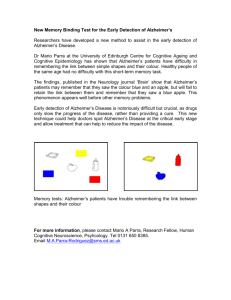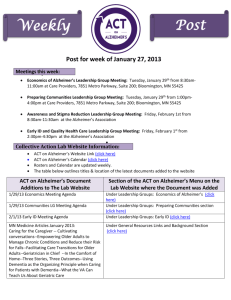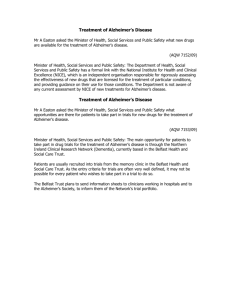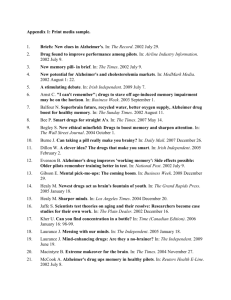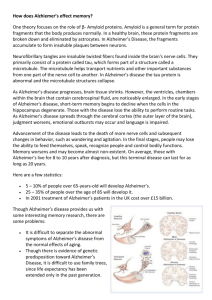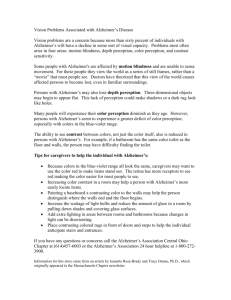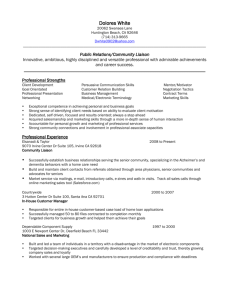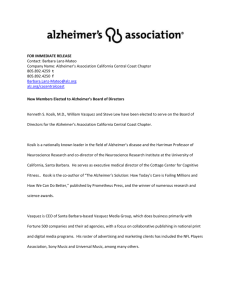Alzheimer`s Disease Information Sheet
advertisement
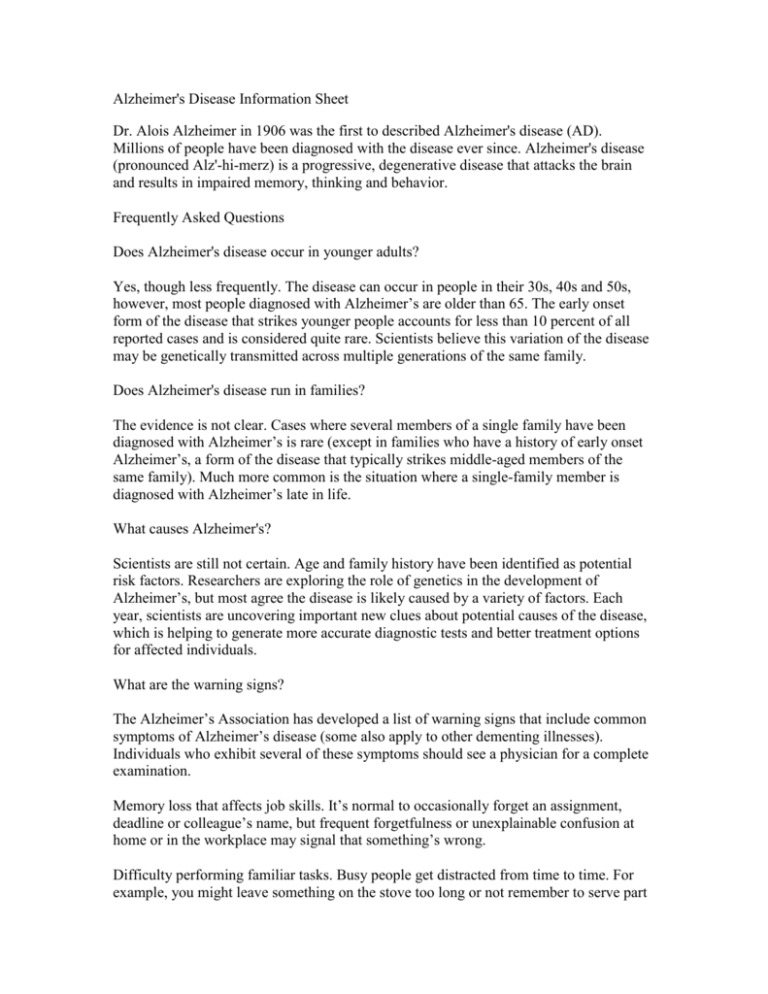
Alzheimer's Disease Information Sheet Dr. Alois Alzheimer in 1906 was the first to described Alzheimer's disease (AD). Millions of people have been diagnosed with the disease ever since. Alzheimer's disease (pronounced Alz'-hi-merz) is a progressive, degenerative disease that attacks the brain and results in impaired memory, thinking and behavior. Frequently Asked Questions Does Alzheimer's disease occur in younger adults? Yes, though less frequently. The disease can occur in people in their 30s, 40s and 50s, however, most people diagnosed with Alzheimer’s are older than 65. The early onset form of the disease that strikes younger people accounts for less than 10 percent of all reported cases and is considered quite rare. Scientists believe this variation of the disease may be genetically transmitted across multiple generations of the same family. Does Alzheimer's disease run in families? The evidence is not clear. Cases where several members of a single family have been diagnosed with Alzheimer’s is rare (except in families who have a history of early onset Alzheimer’s, a form of the disease that typically strikes middle-aged members of the same family). Much more common is the situation where a single-family member is diagnosed with Alzheimer’s late in life. What causes Alzheimer's? Scientists are still not certain. Age and family history have been identified as potential risk factors. Researchers are exploring the role of genetics in the development of Alzheimer’s, but most agree the disease is likely caused by a variety of factors. Each year, scientists are uncovering important new clues about potential causes of the disease, which is helping to generate more accurate diagnostic tests and better treatment options for affected individuals. What are the warning signs? The Alzheimer’s Association has developed a list of warning signs that include common symptoms of Alzheimer’s disease (some also apply to other dementing illnesses). Individuals who exhibit several of these symptoms should see a physician for a complete examination. Memory loss that affects job skills. It’s normal to occasionally forget an assignment, deadline or colleague’s name, but frequent forgetfulness or unexplainable confusion at home or in the workplace may signal that something’s wrong. Difficulty performing familiar tasks. Busy people get distracted from time to time. For example, you might leave something on the stove too long or not remember to serve part of a meal. People with Alzheimer’s might prepare a meal and not only forget to serve it, but also forget they made it. Problems with language. Everyone has trouble finding the right word sometimes, but a person with Alzheimer's disease may forget simple words or substitute inappropriate words, making his or her sentences difficult to understand. Disorientation to time and place. It's normal to momentarily forget the day of the week or what you need from the store. But people with Alzheimer's disease can become lost on their own street, not knowing where they are, how they got there or how to get back home. Poor or decreased judgment. Choosing not to bring a sweater or coat along on a chilly night is a common mistake. A person with Alzheimer's, however, may dress inappropriately in more noticeable ways, wearing a bathrobe to the store or several blouses on a hot day. Problems with abstract thinking. Balancing a checkbook can be challenging for many people, but for someone with Alzheimer's, recognizing numbers or performing basic calculation may be impossible. Misplacing things. Everyone temporarily misplaces a wallet or keys from time to time. A person with Alzheimer's disease may put these and other items in inappropriate places – such as an iron in the freezer, or a wristwatch in the sugar bowl – then not recall how they got there. Changes in mood or behavior. Everyone experiences a broad range of emotions – it’s part of being human. People with Alzheimer's tend to exhibit more rapid mood swings for no apparent reason. Changes in personality. People's personalities may change somewhat as they age. But a person with Alzheimer's can change dramatically, either suddenly or over a period of time. Someone who is generally easy going may become angry, suspicious or fearful. Loss of initiative. It's normal to tire of housework, business activities, or social obligations, but most people retain or eventually regain their interest. The person with Alzheimer's disease may remain disinterested and uninvolved in many or all of his usual pursuits. Scale for Stages of Alzheimer's Scale 1 2 3 4 5 6 7 Stage Normal Adult Normal Older Adult Early Alzheimer's Disease Mild Alzheimer's Characteristics No functional decline. Personal awareness of some functional decline. Noticeable deficits in demanding job situations. Requires assistance in complicated tasks such as handling finances, planning parties, etc. Moderate Alzheimer's Requires assistance in choosing proper attire. Moderately Severe Alzheimer's Requires assistance dressing, bathing, and toileting. Experiences urinary and fecal incontinence. Severe Alzheimer's Speech ability declines to about a half-dozen intelligible words. Progressive loss of abilities to walk, sit up, smile, and hold head up.

